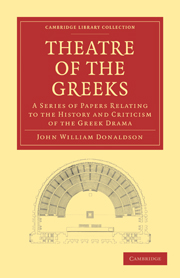I - ARISTOTLE'S POETICS, translated by Twining
Published online by Cambridge University Press: 06 December 2010
Summary
My design is to treat of Poetry in general, and of its several species—to inquire, what is the proper effect of each—what construction of a fable, or plan, is essential to a good poem—of what, and how many, parts, each species consists; with whatever else belongs to the same subject; which I shall consider in the order that most naturally presents itself.
Epic poetry, tragedy, comedy, dithyrambics, as also, for the most part, the music of the flute, and of the lyre—all these are, in the most general view of them, Imitations (οὖσαι μίμησις τὸ σύνολον) differing, however, from each other in three respects, according to the different means, the different objects, or the different manner, of their imitation.
For as men, some through art, and some through habit, imitate various objects, by means of colour and figure, and others again, by voice; so with respect to the arts above-mentioned, rhythm, words, and melody (ρνθμο'ς, λόγος, ἁρμονία), are the different means by which, either single, or variously combined, they all produce their imitation.
For example : in the imitations of the flute, and the lyre, and of any other instruments capable of producing a similar effect—as the syrinx, or pipe—melody and rhythm only are employed.
- Type
- Chapter
- Information
- Theatre of the GreeksA Series of Papers Relating to the History and Criticism of the Greek Drama, pp. 155 - 194Publisher: Cambridge University PressPrint publication year: 2010First published in: 1836



